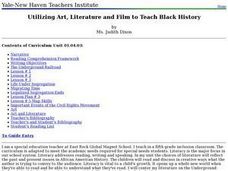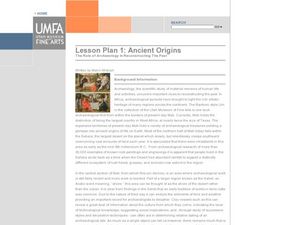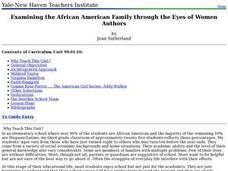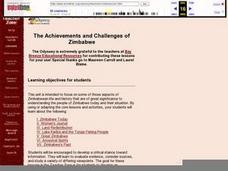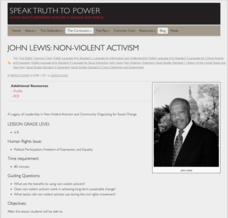Curated OER
African-American Art and the Political Dissent during the Harlem Renaissance
High schoolers are introduced to the culture of African American art. Using the internet, they research the events surrounding the Harlem Renaissance and discover how it produced a wide variety of art and literature. To end the...
Curated OER
Famous African Americans ABC Book
Students investigate the concept of a biography by using famous African Americans for a subject. Each student is assigned one biography and conducts research in order to complete an ABC book for the class that is used for display...
Curated OER
Utilizing Art, Literature and Film to Teach Black History
Fifth graders are introduced to different aspects of African-American history through literature, art, and films. As a class, they are read a story about the Underground Railroad, identify the main characters and put the events into...
Curated OER
Translating African Masks
Students identify traits of African masks. In this multicultural art lesson, students view online examples of African masks and discuss the characteristics of the masks. Students create an original 2-D version of the African mask by...
Curated OER
Ancient Origins: The Role of Archaeology in Reconstructing the Past
Students read information about the ancient origins of art and archaeology with a focus on the Malian culture. For this art origins lesson, students read background information for the topic and compare ancient and contemporary objects....
Curated OER
Examining the African American Family through the Eyes of Women Authors
Students read stories by women authors on the characteristics of the African-American family. Using the internet, they research the history of issues that have affected African-American families from the Civil War to the Civil Rights...
Curated OER
Mapping the African American Past
Fourth graders explore the African Americans impact on New York. In this US History lesson, 4th graders examine an archaeological website. Students research the Five Points neighborhood.
Curated OER
Black History Month - - Mary Seacole CV
Students commemorate black history month. Using the Internet, information books and printed web pages, students research the events of Mary Seacole's life. Students role play Mary Seacole being interviewed for a job.
Curated OER
The Jim Crow Era
Learners examine how African-Americans were affected by the Great Depression. In this African-American history lesson, students conduct independent research on the social conditions of the time period using the suggested resources....
Curated OER
Who Do You Know?
Young scholars research and describe the contributions of African-American men and women. They write their notes in a Microsoft Word document. They present their information to the class.
Curated OER
Cyberspace Safari
Middle schoolers go on an information gathering hunt on the Internet to study West African empires. They work in teams; meteorologists, bankers, writers, and archaeologists. They collect data on all sorts of topics related to West...
Curated OER
The Achievements and Challenges of Zimbabwe
Here is an excellent set of five short lessons and activities intended to help learners not only gain an understand of current issues in Africa, but build critical thinking, synthesis, analysis, expository writing, research, and...
John F. Kennedy Center
Harriet Tubman: An Informative and Impressionistic Look
Informational text and impressionistic art lead a lesson about Harriet Tubman. Working in teams, scholars examine a variety of resources. They analyze, compare, and contrast the work. Using their research findings, pupils create an...
National Park Service
Discover the Mary Ann Shadd Cary House
Mary Ann Shadd Cary was an extraordinary woman, no matter the time period. Academics research the life and achievements of Mrs. Cary, who was born a free African American in 1823. The lesson plan uses primary sources, worksheets, written...
John F. Kennedy Center
Musical Harlem: How Is Jazz Music Reflective of the Harlem Renaissance?
Bring jazz music and the Harlem Renaissance to light with a instructional activity that challenges scholars to research and create. Pupils delve deep into information materials to identify jazz terminology, compare types of jazz and jazz...
Albert Shanker Institute
Strategizing for Freedom
Booker T. Washington, W.E.B. DuBois, Marcus Garvey, and A. Philip Randolph developed different views on how to advance civil rights for African Americans. Class members research these famous figures and their strategies before developing...
Teaching Tolerance
Mass Incarceration as a Form of Racialized Social Control
Mass incarceration: A result of a tough stance on crime or racial discrimination, you decide. Academics explore the history and reasons behind mass incarcerations in the United States and its impact on ethnic communities. The...
Center for History Education
Helping to Move On? An Analysis of the Reconstruction Amendments
Reconstruction amendments: a helping hand or another form of slavery? An inquisitive lesson compares the Reconstruction legislation that ended slavery, granted citizenship, and protected voting right for African American men. Scholars...
US National Archives
Documented Rights Educational Lesson Plan
How have groups struggled to have their unalienable rights recognized in the United States? Acting as a research team for the Human Rights Council of the United Nations, your young historians will break into groups to research how people...
Teaching Tolerance
Understanding the Prison Label
Break the chain. An engaging lesson examines why it is so hard to break free of the prison system in the US. Academics participate in a reader's theater, read primary sources, and discuss their thoughts. The lesson explains the hardships...
Smithsonian Institution
Native Resistance: Native Resistance Then and Now
Native Americans lost so much—and gained so little in return. Scholars explore Native Americans' resistance to the United States government. The lesson uses primary sources to explore the different forms of protest and gives a voice to...
K20 LEARN
LBJ and Voting Rights
Challenges to voting rights is not a new thing. Using President Lyndon B. Johnson's 1965 "The American Promise" speech on voting rights as a starting point, young historians research current voting rights laws and challenges.
American Battlefield Trust
Contraband Camp
An educational lesson plan explores the plight of African Americans escaping slavery during the Civil War. Learners view a presentation and analyze primary documents and images to understand the purpose of contraband camps and how they...
Speak Truth to Power
John Lewis: Non-Violent Activism
After comparing and contrasting non-violent and violent social movements, your young historians will take a closer look at the work and influence of John Lewis on the civil rights movement. They will then choose a current social justice...




